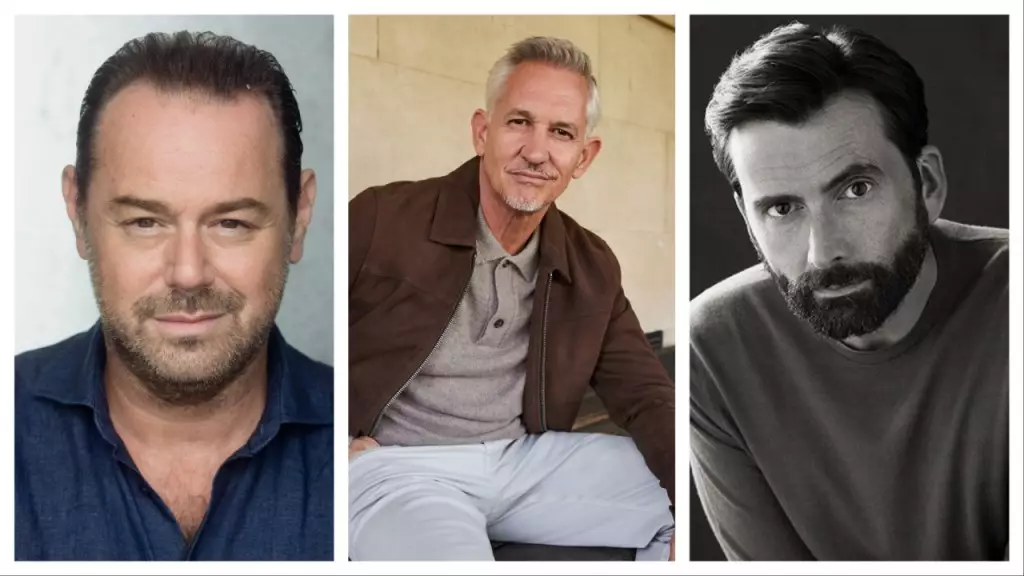In the realm of television journalism, ITV’s upcoming show, *The Assembly*, stands poised to be a pioneering force. This innovative format seeks to disrupt the traditional interview landscape by placing celebrities in the hot seat—interviewed by a diverse panel comprising individuals who are autistic, neurodivergent, or have learning disabilities. This approach not only fosters inclusivity but also enriches the dialogue surrounding disability by showcasing the unique perspectives and insights of those who are often marginalized. In a world where representation matters as much as authenticity, *The Assembly* could set a new precedence for how we engage with public figures.
The inaugural season features an impressive ensemble: Gary Lineker, Danny Dyer, David Tennant, and Jade Thirlwall. Each of these personalities brings their own fan base and public persona to the show, ensuring a blend of entertainment and meaningful dialogue. Lineker, known for his long-standing role as the face of *Match of the Day*, will be making his appearance shortly before transitioning from his 25-year tenure on the program. Dyer and Tennant, who recently garnered positive attention for their roles in the adaptation of Jilly Cooper’s *Rivals*, further amplify the show’s draw. Thirlwall, with her background in the popular group Little Mix, adds a contemporary appeal that attracts younger audiences.
Crucially, *The Assembly* has undergone meticulous planning to ensure it resonates positively with its unique audience. Collaborating with various national and local organizations representing autistic and neurodivergent communities, the production team has prioritized not just representation but the authenticity of the experience. This inclusivity reflects a growing trend in media where creators are actively working to incorporate voices from historically underrepresented demographics, creating programming that speaks to the lived experiences of a broader audience.
Katie Rawcliffe, Director of Entertainment & Daytime at ITV, expressed her enthusiasm for the show, stating that the combination of star power and compelling conversations promises to deliver “captivating, unmissable television.” This sentiment highlights a recognition in the industry that viewers are seeking content that resonates on a deeper level—one that doesn’t merely entertain but also informs and challenges societal perceptions.
Originally conceived as *Les Rencontres du Papotin* in France, *The Assembly* has made waves internationally, with adaptations sprouting in Denmark, Poland, Spain, and Australia. Notably, the French iteration showcased interviews with significant figures like President Emmanuel Macron and actress Camille Cottin, demonstrating the format’s ability to elicit revealing and heartfelt discussions regardless of the high-profile subject. Antonio Banderas has also faced the distinctive interview style in Spain, which underscores the adaptability and universal appeal of *The Assembly*’s format.
The Australian version of the show has received considerable attention as well, featuring appearances from significant cultural figures, including Prime Minister Anthony Albanese. This international trajectory not only validates the format’s concept but also reflects a burgeoning recognition of the importance of neurodiversity in media narratives globally.
As *The Assembly* prepares to debut on ITV, it stands as a crucial step toward a more inclusive media landscape. The integration of neurodivergent voices in mainstream programming may push other networks and producers to reevaluate their own approaches. By deviating from traditional formats, *The Assembly* not only promises entertainment but emphasizes the significance of giving a platform to those whose perspectives are vital to societal understanding.
As viewers, we have the opportunity to engage with this transformative approach. Supporting shows that prioritize neurodiversity is essential for paving the way for more inclusive storytelling in the future. With *The Assembly*, ITV has not just created a show; they have set an example of how media can evolve, reflecting the rich tapestry of human experience with empathy and authenticity.
